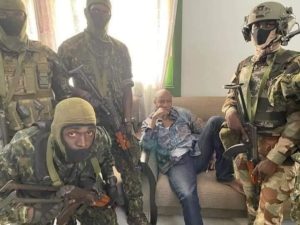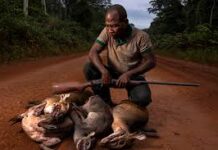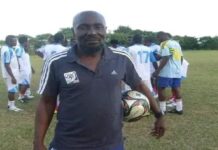Former Liberian President Ellen Johnson Sirleaf has condemned the military coup in Guinea and called for respect for the rule of law.
Ms Sirleaf expressed concern at how the ousted President Alpha Condé was treated by the military.
Madam Sirleaf indicated that she was not happy with the way Mr. Conde was portrayed in images of him after been arrested by the elite forces.
“He was not properly dressed and for somebody who has served his country for so many years, he was put in a very unsettling position,” Ms Sirleaf said.
The former Liberian leader told the BBC that she had great confidence in the West African block ECOWAS to resolve the situation.
“I’m sure that ECOWAS, which has successfully responded adequately to similar crisis will do so in keeping with the constitution and the rule of law in Guinea,” she said.
Ms Sirleaf said the setting up of transitional bodies would ensure that the provision of services to the public continues.
The former Liberian head of state said the coup trend in West Africa was “worrying” and accredited it to the “changing world and global attitudes about Democracy, open society” and urged governments to “ensure their institutions are consistent with the national agenda”.
The Nobel laurel indicated that she was openly confident that the situation in neighboring will not reach a point where people will be forced to leave their country and seek refuge in other places.
The Coup
Members of the elite army led by Mamady Doumbouya, in the morning hours of Sunday September 5, 2021 stage a coup and ousted President Alpha Conde.
Doumbouya accused Mr. Condé, 83, of rampant corruption and human rights abuses.
The deposed president’s whereabouts are unclear, although the coup leaders have said he is safe.

An earlier video sent to AFP by the putchists showed President Alpha Conde sitting on a sofa surrounded by troops.
The 83-year-old leader refused to answer a question from one soldier about whether he had been mistreated.
“We have decided, after having taken the president, to dissolve the constitution,” said a uniformed officer flanked by soldiers toting assault rifles in a video.
The officer also said that Guinea’s land and air borders had been shut and the government dissolved.
Later Sunday the junta announced a nationwide curfew “until further notice”, saying it would convene Conde’s cabinet ministers at 11am Monday.
“Any refusal to attend will be considered a rebellion,” the statement added.
The country’s governors and other top administrators will be replaced by the military, the statement said.
The coup leader has also said a new “union” government would be formed in weeks. Col Mamady Doumbouya told ministers who served in Mr. Condé’s government that there would be no witch-hunt against former officials.
Col Doumbouya, who heads the army’s Special Forces unit, did not say on Monday when the new government would be in place.
“A consultation will be launched to set down the broad parameters of the transition, and then a government of national union will be established to steer the transition,” he said in his statement.
International Response
International organizations including the UN, African Union and the regional bloc ECOWAS have since condemned the coup and called for a return to civilian rule.
“I strongly condemn any takeover of the government by force of the gun and call for the immediate release of President Alpha Condé,” UN Secretary-General António Guterres tweeted.
The regional bloc ECOWAS has suspended Guinea from the West African regional bloc.
The bloc also demanded Mr. Condé’s release from custody.
Leaders of the 15-nation bloc held a virtual meeting to discuss the coup waged by elite troops led by the 41-year-old Col Mamady Doumbouya.
Guinea is one of the world’s biggest producers of bauxite, the raw material for aluminum, and prices have leapt to a 13-year-high following the coup.
Despite its natural resource blessings, it is still counted amongst the poorest countries in the world.























Comments are closed.